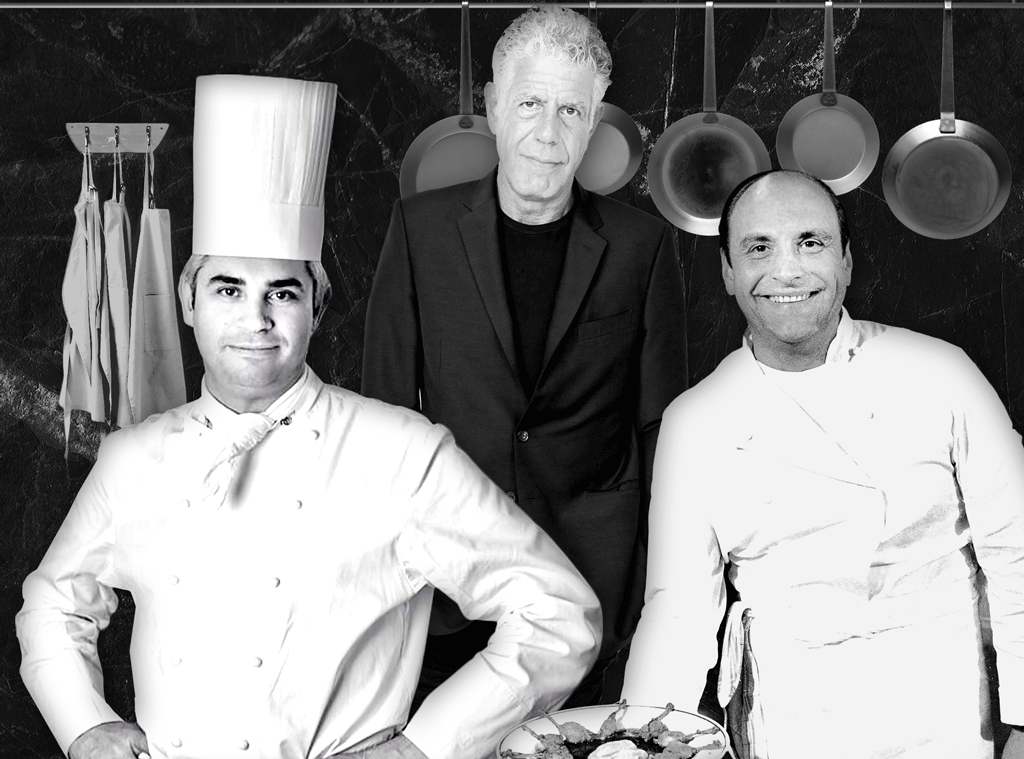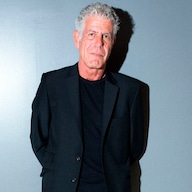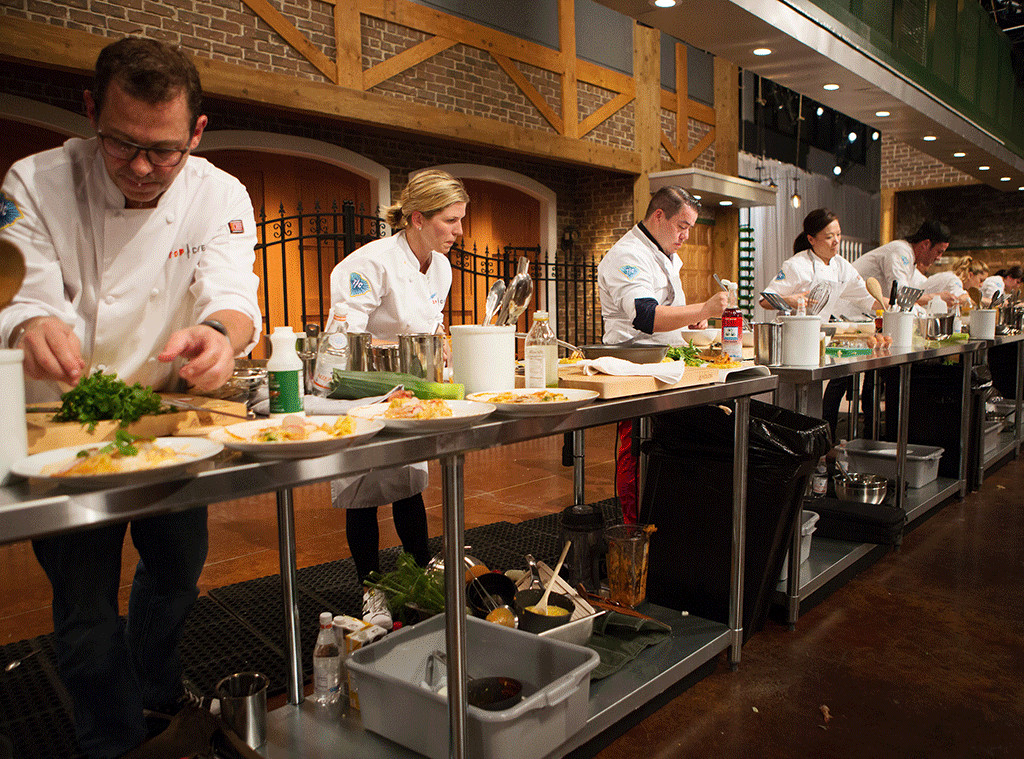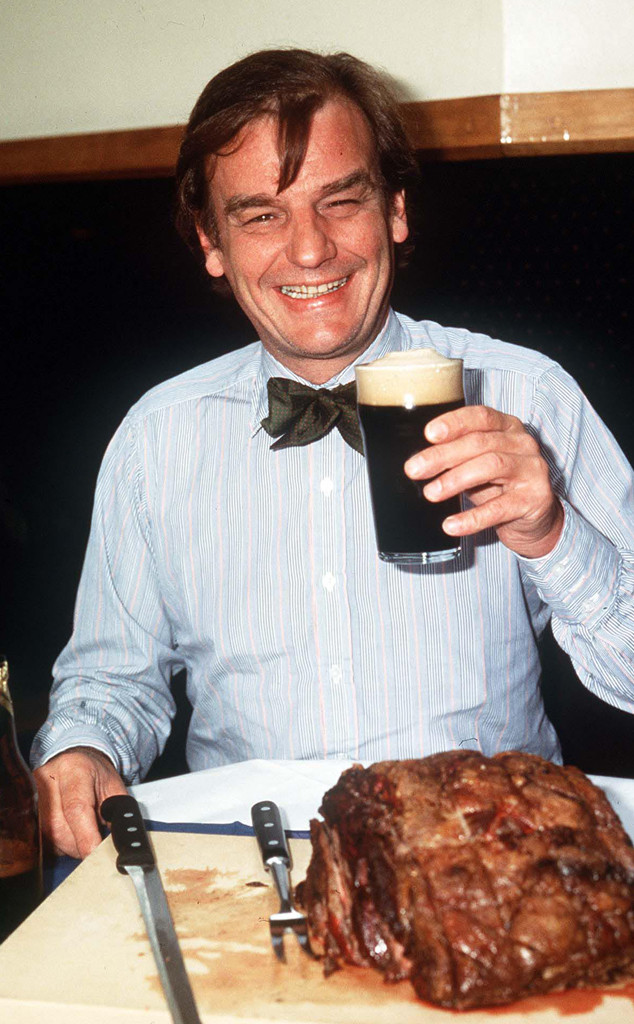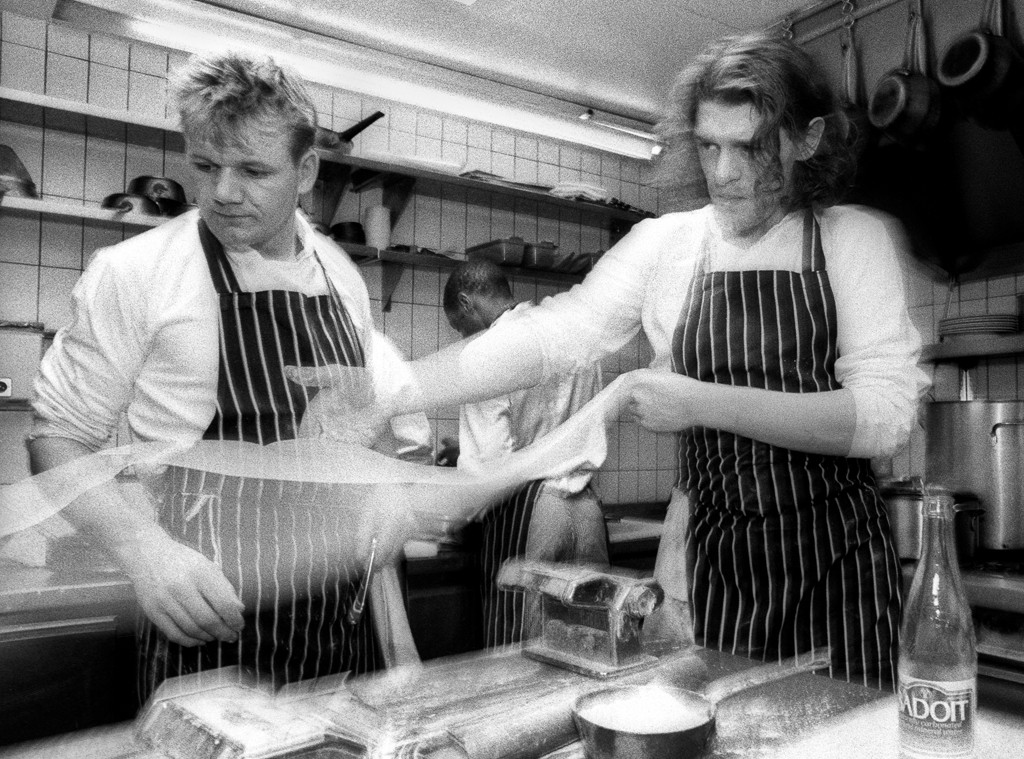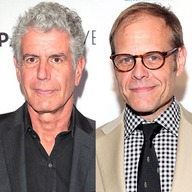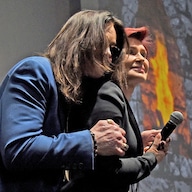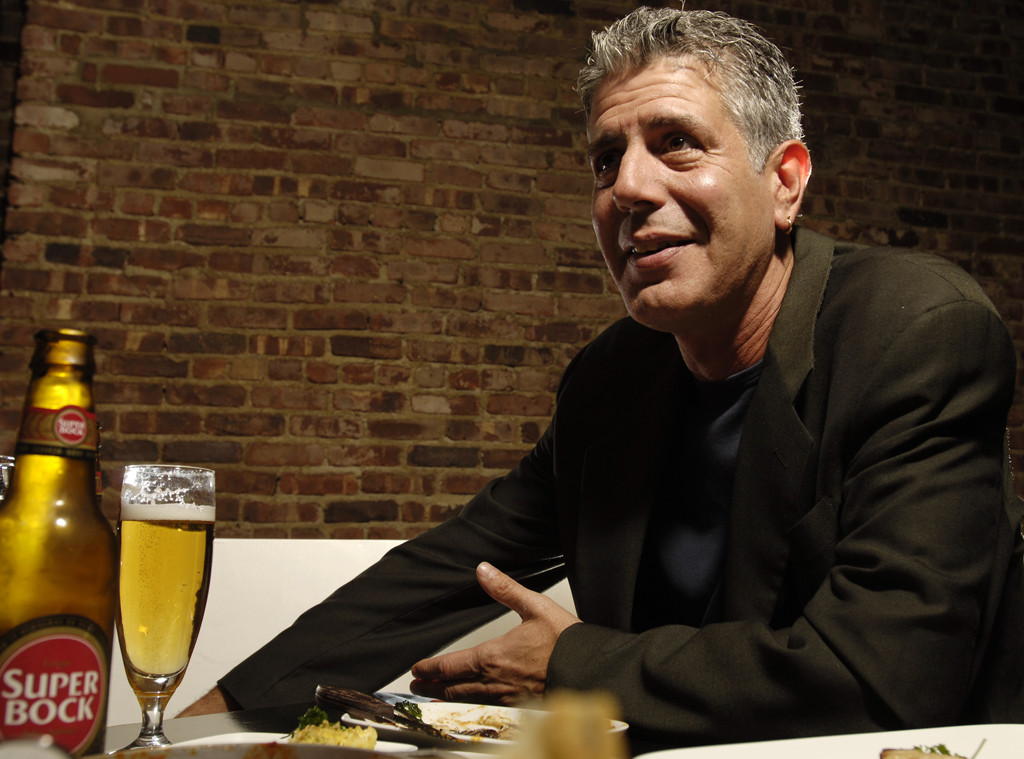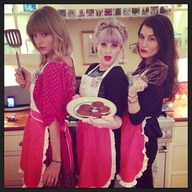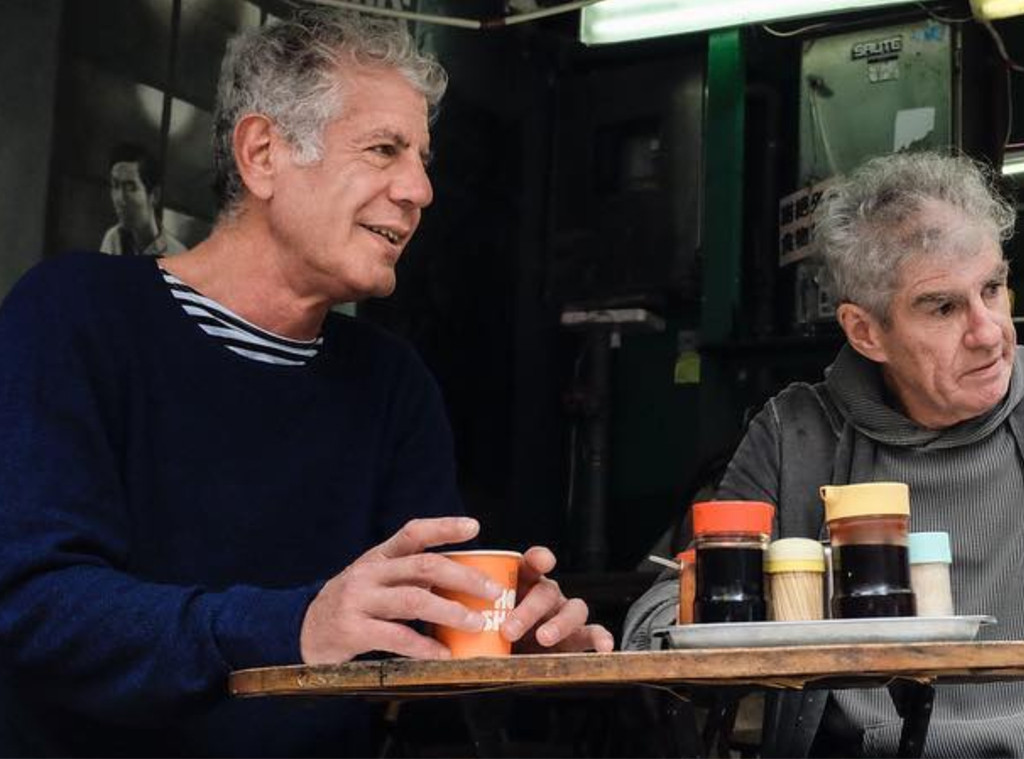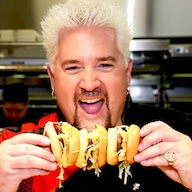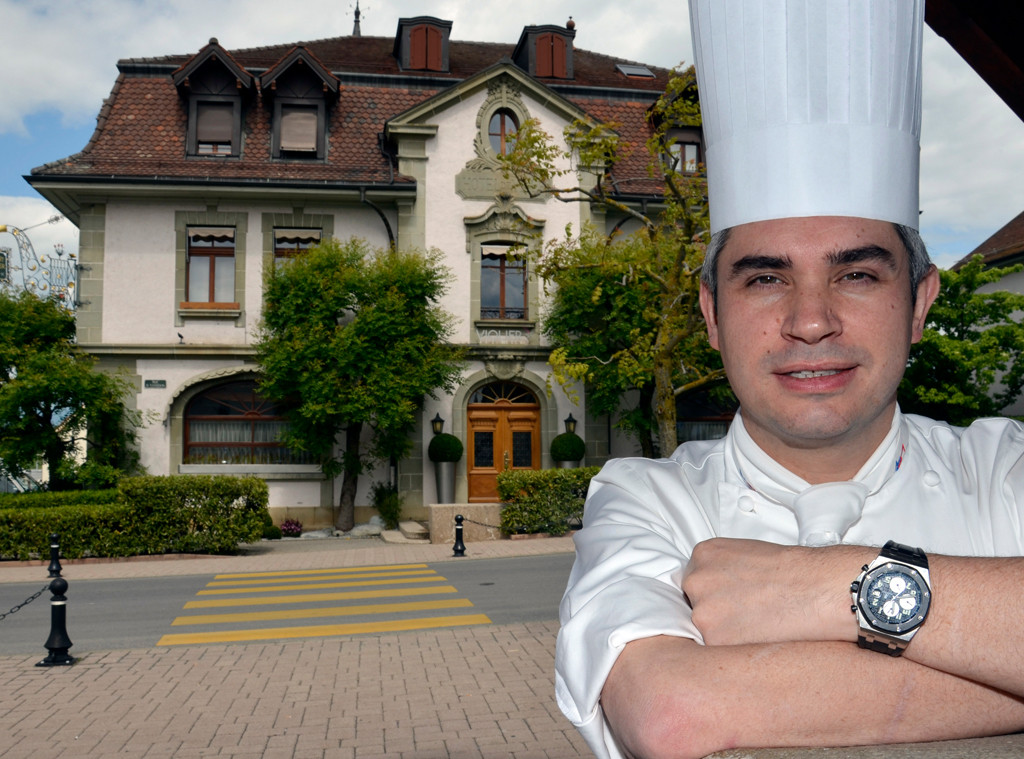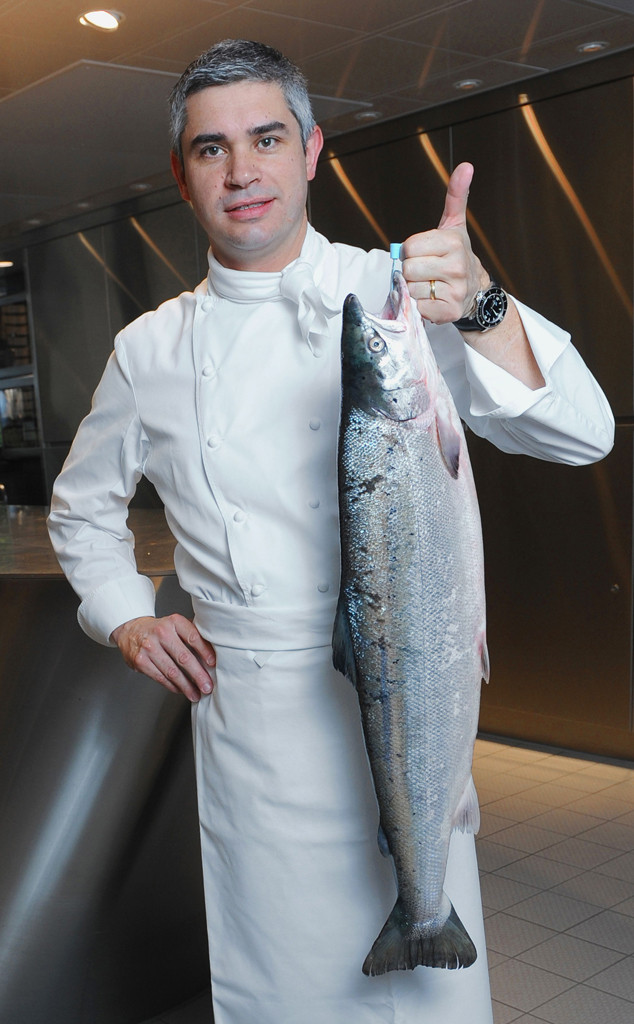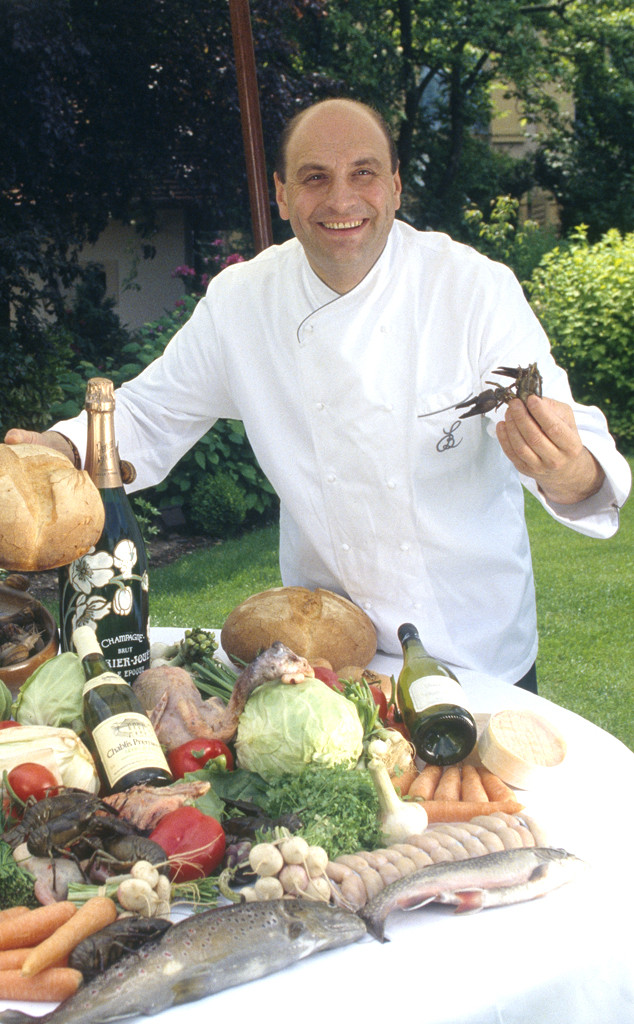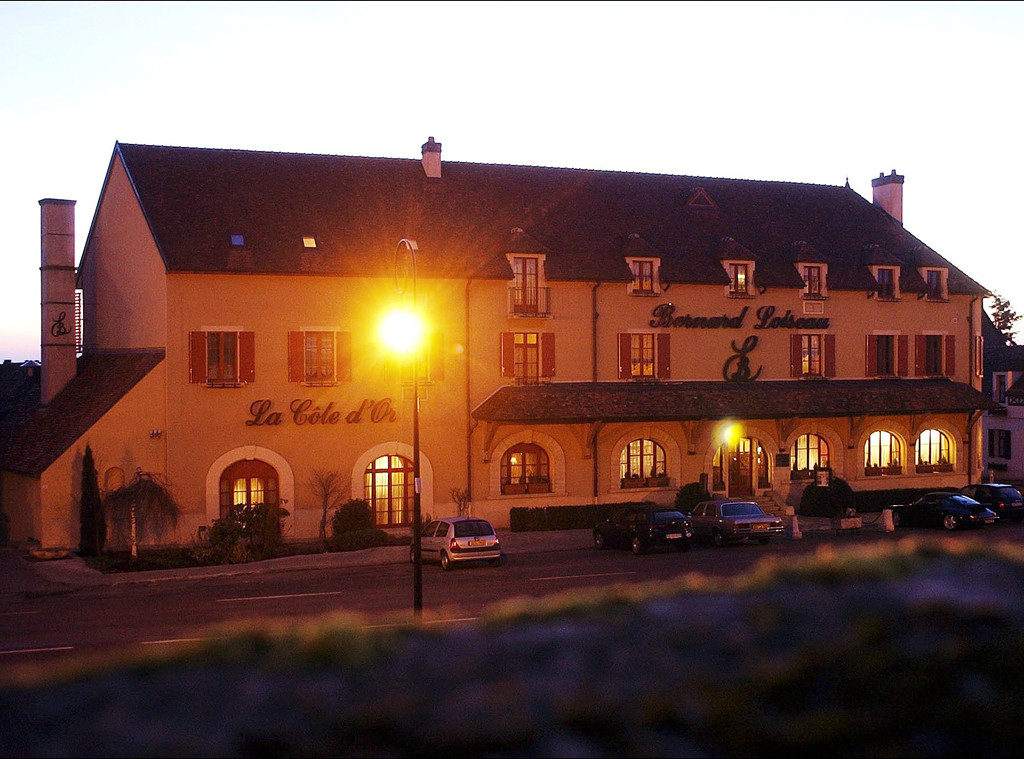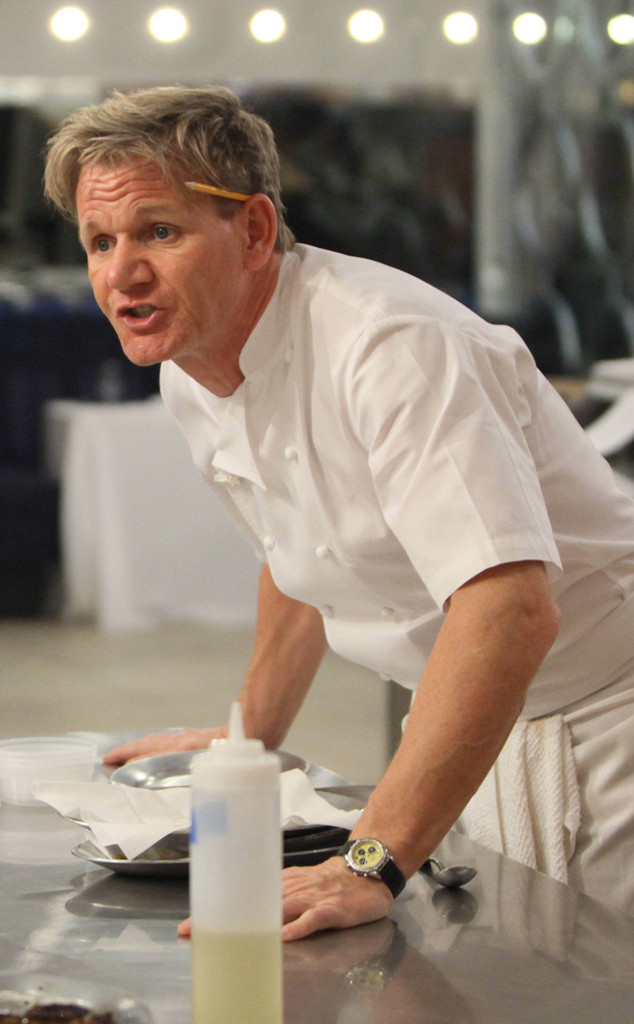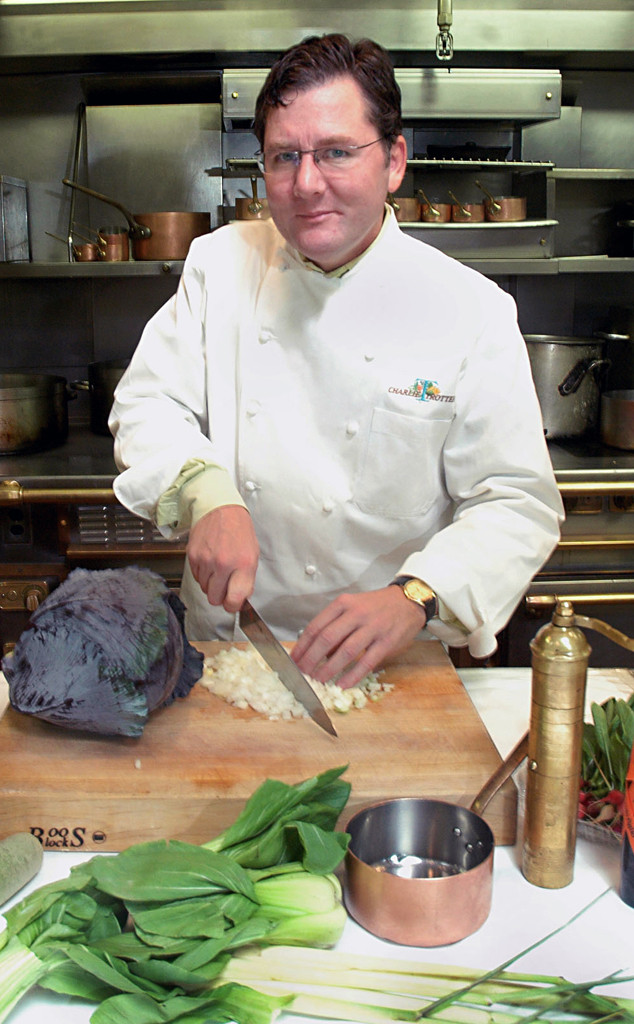Melissa Herwitt/E! Illustration
Anthony Bourdain was first to admit, sometimes in jest but usually not, that he considered himself a damaged person.
And he didn’t just diagnose himself. He was also perhaps the biggest star of the culinary world to prominently assert that those who chose to toil in the restaurant business—chefs, in particular—are misfits by nature.
Bourdain didn’t mean that food caused a certain derangement. Rather, the food was the salve, the balm that soothed the ragged souls of those who devoted their lives to the profession, to conceiving dishes, preparing food, serving it—and obsessing over it. In turn, a bond can’t help but form, not just between those who share a kitchen night after night, but among anyone who chose to commit to the cause, whether they knew each other personally or not.
Photos
Anthony Bourdain: A Life in Pictures
Celebrity chefs aren’t an entirely 21st century phenomenon (Julia Child‘s The French Chef premiered on public television in 1963), but it’s only over the past decade or so that they’ve approached rock star status outside their own insular world. Chefs have been applauding, copying and feuding with each other presumably as long as there have been restaurants, but it took some time for them to become objects of worship among the masses.
Bravo
The heavily tattooed, often pierced and punkishly coiffed chef, whether male or female, has also become a stereotype—and while that’s hardly the classic universal look for a chef (which was more sky-high toque than mohawk), it certainly goes with the artistic vibe that more and more chefs are projecting. Cooking is also increasingly being recognized as an art form—it’s on TV 24/7, after all, and two people can pay into the thousands of dollars to eat at certain restaurants—and as long as there has been art, there have been patrons going gaga when they discover new talent.
Bourdain—though he became the “bad-boy chef” poster boy for a generation with his frank anecdotes about drug and alcohol abuse, getting laid and acquiring the physical and mental scars of battle that accumulate over years of working the line—did not create the role.
In 2007, he only came in second when Olive magazine issued its list of the “most decadent foodies” of all time.
In first place was British chef Keith Floyd, whose TV-enhanced fame preceded the likes of Gordon Ramsay, and who when he died in 2009 was remembered as much for his hard-living ways as for his way around a kitchen. Married four times, he served in the British Army and worked as a journalist before settling into cooking. He also had a 2004 conviction for drunken driving after crashing his car with 3 1/2-times the legal limit of alcohol in his system.
Photoshot/Getty Images
His partner, Celia Martin, told London’s Telegraph that Floyd suffered a fatal heart attack just as they were settling down on the sofa to watch a Channel 4 documentary about his eventful life —and just hours after they shared a champagne toast over lunch to celebrate good news from his oncologist.
“I spoke to him on the telephone at 7 p.m. when he told me had a great meeting with the cancer specialist that morning,” said James Steen, who ghost wrote Floyd’s memoir Stirred but Not Shaken, told the paper. “They had told him they thought he was in the clear but to slow down on the alcohol…He said he had not felt this good in years which was why the heart attack was so unexpected. Celia is in a state of total shock.”
“He inspired a nation to want to cook, which very few chefs have done,” stated chef Marco Pierre White, considered a bad-boy disciple of Floyd’s (and No. 3 on Olive‘s list), in tribute. “His confidence at the stove was extraordinary. He was a beautiful man, very kind, and supportive. He was a truly great man. He will never be replaced.”
Christopher Pillitz/Getty Images
White, meanwhile, claimed to have made Gordon Ramsay cry when the famously profane Hell’s Kitchen star was under his tutelage decades ago. In 2006 he told the Telegraph while promoting his memoir White Slave that he would “never speak” to his former protegee again. “I gave him his first break in the business and I believe strongly in being loyal to people who have helped you,” White said. “Is that strange? I don’t believe it is. Several things happened that I found completely unacceptable and I talk about them in the book.” (One of them being that Ramsay apparently brought a camera crew to the wedding when White married his third wife, Mati.)
“You can’t be a chef and appear on television all the time. It’s impossible,” White said. “At least when I earned my stars I was always behind my stove.” At 33, White became the youngest-ever chef to earn a third Michelin star. He gave them back in 1999, later telling the Daily Mail, “I was a bit lost, I was no longer happy in the kitchen. Winning three stars is a very exciting journey… retaining them is boring. But I place a lot of value on my stars, that’s why I gave them back.”
Ramsay’s rep confirmed there was “some truth” to the crying story, though he had only been 20 and just starting out when it happened. Gordon won’t be “descending into a slanging match,” the rep said.
Photos
Celeb Food Fights
But in 2017, when White brought the crying up again on Hell’s Kitchen Australia, Ramsay retweeted an unfavorable note about the show and wrote, “I’m crying with laughter this time! That’s the second one he’s screwed up! The UK and now Australia, HK US season 17 starts soon Marco x.” (Ironically, in 2007 White started appearing regularly on international versions of Hell’s Kitchen and MasterChef.)
White and Mati have three children together (he also has a daughter with his first wife), but not long before the 2006 Telegraph interview she had accused a waitress of being the second of two waitresses to sleep with her husband. At his restaurant. In front of customers. “The main point for me is that I have not been unfaithful to my wife and I am still in love with her. We are still together,” White told the paper.
The volatile couple started divorce proceedings in 2007, then reconciled and re-separated; as of 2015 they were still legally married but White had been in a relationship with actress Emilia Fox for several years.
“She is the mother of my three very, very, very beautiful children,” White told the Daily Mail about Mati in 2015. “We spent a long time of our lives with one another. I’ll always love her. She’s a special and wonderful woman.”
Photos
Stars React to Being Cheated On
Talking about his most treasured souvenirs from his travels, Anthony Bourdain told Bon Appétit just last fall, “Probably my most treasured was a bronze head of a deer that Marco Pierre White shot, and when we went hunting together, he couldn’t wait for the deer that I shot to be prepared, so he gave me one of his. It’s on a stand that says ‘shot by Marco Pierre White, on such-and-such date and such-and-such place.'”
Bourdain counted White, who was on the London episode of Anthony Bourdain: Parts Unknown, as one of his biggest inspirations.
“To see [Marco] at rest,” he said on his show, “surrounding himself with beautiful things, in the countryside he has always felt strongly connected to, went a long way towards reassuring me that there are happy endings.”
Bourdain also inspired many a bucket list with his series of shows, which followed him all over the world, including to Hanoi, Vietnam, in 2016, where he swapped stories with President Barack Obamaover bun cha and beer.
Though he was most recently known for having secured what looked like the greatest job in the whole world, Bourdain sometimes lamented that his initial tale of restaurant-world madness—the viscerally authentic Kitchen Confidential: Adventures in the Culinary Underbelly—glamorized the more grotesque side of his earlier, pre-stardom life to many readers.
James Keivom/NY Daily News Archive via Getty Images
“A lot of people think it’s OK to get f–ked up and work,” he told Smithsonian Magazine in 2014. “Kitchen Confidential was not a story about a particularly good or commendable career. It was my life; I wrote it in a way that made it sound like a lot of fun, but obviously it wasn’t. I think a lot of people tend to overlook that. It validates a lot of bad behavior.”
He was deeply committed, however, to his second chapter, that of globetrotting food ambassador who went places no one else was going (the Congo, Iran, etc.) and breaking bread—or naan, pita, injera, tortillas, etc.—with the locals, forming connections that perhaps only sampling the native cuisine could facilitate. And then there was his third chapter, that of doting dad to daughter Ariane, with second wife Ottavia Busia.
“I’m shocked by how happy my daughter is,” he told The New Yorker in 2016. “I don’t think I’m deluding myself. I know I’m a loving father…Do I wish sometimes that, in an alternative universe, I could be the patriarch, always there? Tons of kids? Grandkids running around? Yes. And it looks good to me. But I’m pretty sure I’m incapable of it.”
Photos
Celebrity Foodies
While Bourdain became a downright noble figure to some, he was also ultimately hero and villain of his own story, his darkest self the one force he couldn’t kick the way he kicked heroin, cocaine and being a part of the historically toxic restaurant culture that was no friend to women and remains in the process of evolving.
His suicide last month in France couldn’t have felt more startling, no matter how much he had previously talked about depression or described his instances of self-loathing over choices made and relationships unraveled. He had been writing about that stuff for years, after all. He was in town to shoot Parts Unknown, which he had been doing earlier in the week with one of his best friends, chef Eric Ripert, who was the one to find Bourdain unresponsive in his hotel room on the morning of June 8.
CNN
Rose McGowansaid that both Bourdain and Asia Argento, his girlfriend for the last two years of his life, had struggled with depression and thoughts of suicide. “And through a lot of this last year, Asia did want the pain to stop,” McGowan wrote in a letter released to the media last month, spurred partly by speculation that Bourdain’s actions were triggered by problems between him and Argento (whom he had fiercely supported last fall when she and McGowan publicly accused Harvey Weinstein of sexual assault).
“Thankfully,” McGowan continued, “she did the work to get help, so she could stay alive and live another day for her and her children. Anthony’s depression didn’t let him, he put down his armor, and that was very much his choice. His decision, not hers. His depression won.”
Even on the upbeat entertainments that are the culinary competitions such as Chopped and Top Chef, numerous contestants have shared stories about past drug abuse, being in recovery, being broke, having rifts with their families or, almost to the person, feeling guilty about hardly getting to see their families because they’re always busy with their own restaurants or working their way up the ladder. There’s always someone they want to pay back, whether it’s an endlessly patient spouse, a sacrificing parent or a charity close to their heart.
Bourdain was onto something with his characterization of wandering souls flocking to the kitchen, even if he was mainly being hard on himself.
Photos
Food Network Star Winners: Where Are They Now?
The culinary world was rocked by a comparably shocking tragedy on Jan. 31, 2016, when 44-year-old Benoît Violier—whose Restaurant de l’Hôtel de Ville Crissier in Switzerland, had just been named No. 1 out of 1,000 establishments in 48 countries by France’s La Liste—killed himself at home while his family was at lunch—reportedly with the shotgun he used for hunting the game that had helped put him on the culinary map.
He died on a Sunday, hours after overseeing Saturday night dinner service.
MARCEL GILLIERON/AFP/Getty Images
Violier was married and had a 12-year-old son. He was supposed to be going to Paris that afternoon for the new Michelin Guide unveiling, his establishment expected to keep the maximum three stars it had previously earned. He wasn’t an extremely public figure outside of the elite-restaurant and committed-foodie world, but when he did talk about his life he sounded like a lot of other well-known chefs.
“The strictness about myself always has to increase more and more and the gestures pushed in its most pure way,” he told Andy Hayler’s Restaurant Guide in 2012. “Nothing can be definitively acquired; everything must be done all over again every day. My enthusiasm makes me become a passer of knowledge in the art of good taste, knowledge of the ancients and the achievements of modernity. I love communicating my passion with those who fall in love with cookery, just like me.”
AFP / ALAIN GROSCLAUDE/ Getty Images
Or, as he told Switzerland’s RTS network in 2014, simply, “I go to sleep with cooking, I wake up to cooking.”
That hadn’t changed a bit. He had suffered painful losses in 2015, however, both the death of his father and his mentor Philippe Rochat, his predecessor at l’Hôtel de Ville who had died suddenly at the age of 61 while riding a bicycle. (Eerily, Rochat’s wife, distance runner and 1997 New York City Marathon winner Franziska Rochat-Moser, was killed in an avalanche while skiing in the Swiss Alps in 2002.)
A reported 1,500 people attended Violier’s funeral in Lausanne, Switzerland. When the 2016 Michelin Guide came out that fall, Restaurant Hotel d’Ville Crissier still had three stars and still does to this day.
Sergio Gaudenti/Sygma via Getty Images
Nevertheless, his death reminded the culinary world of Bernard Loiseau, a revered, Legion of Honor-awarded French chef and married father of three who shot himself (also with a hunting rifle) in 2003—because, according to the general consensus that formed in the wake of his death, he had just fallen in the prestigious Gault-Millau ranking and was tormented by the prospect of losing one of his three Michelin stars. He was 52.
“Recipe for Disaster: Critics Drive French Chef to Suicide,” screamed the New York Post.
Michelin denied ever telling Loiseau his Burgundy restaurant La Côte d’Or might be knocked down a star, according to The New Yorker, but minutes from a 2002 meeting the chef had with Michelin officials indicated a discussion was had about the possibility, and Loiseau was “visibly shocked.”
Francis DEMANGE/Gamma-Rapho via Getty Images
A host of notable chefs, including French legend Paul Bocuse, didn’t hold back in directing some of the blame for Loiseau’s death at his critics, however.
”Bravo, Gault-Millau, you have won,” Bocuse, who died in January at 91, was quoted in Le Parisien in 2003. He then told The New York Times, “I always told [Loiseau] the problem with being at the top is that you can fall. I felt that pressure at age 40, at age 50, at age 60, at age 70. Now at 80, I’m better able to deal with it.”
All 24 of France’s three-star chefs are said to have attended Loiseau’s memorial service. La Côte d’Or retained its third star when the 2004 Michelin Guide came out.
First Loiseau’s suicide and then Violier’s 13 years later drew attention to just how much of a hotbed of pressure the restaurant world is, not only for those struggling to get by, but also for those who’ve made it to the top of the food chain only to live in mortal fear of losing that third star.
A biography published in 2005 about Loiseau was called The Perfectionist. In the book, author Rudolph Chelminski recalled asking his friend if he ever slowed down. To which Loiseau replied, “You have no idea how far I go when I go down.”
Photos
Celebrity Deaths: 2018’s Fallen Stars
A week after Violier died, the Swiss magazine Bilan reported (per the Telegraph) that he may have been the victim of a wine-buying ponzi scheme that cost his restaurant more than $1 million. A restaurant shareholder categorically denied that Violier was the victim of anything, however, telling the paper, “The restaurant was absolutely not touched and the Violier family had nothing to do with this affair. The restaurant is full. It is better than in any previous year. It is a record year. The restaurant has a very solid financial base.”
Marco Pierre White gave his Michelin stars back in 1999, telling the Daily Mail years later his restaurant had turned into “very repetitive, conveyor-belt cuisine. People were coming in for those specials. You keep delivering those specials. I was a bit lost, I was no longer happy in the kitchen. Winning three stars is a very exciting journey… retaining them is boring. But I place a lot of value on my stars, that’s why I gave them back.”
Restaurant Gordon Ramsay, his flagship establishment in London, has had three stars since 2001. And for all his bluster, the prolific restaurateur and TV star has seen his share of tragedy in the business.
Patrick Wymore / FOX
In 2003, David Dempsey, a 31-year-old cancer survivor and the newly installed head chef at Ramsay’s eponymous London restaurant, plunged 40 feet to his death while under the influence of cocaine at a residence where he was buying drugs—hours after having dinner with his boss.
“I wish I’d seen signs earlier,” Ramsay said on The Jonathan Ross Show last year, promoting his ITV docu-series On Cocaine. “Cooking at a level where everyone is under that pressure but you don’t need that substance to continue. It was a big loss… I think the image today of a chef, I think everyone thinks it’s this rock and roll lifestyle and you need that help, that substance.”
Also on the show, Ramsay had the toilets in the guest and staff bathrooms at his namesake three-star restaurant tested for cocaine residue—and they lit up.
“I called a meeting,” he told Ross. “I didn’t throw anyone under the bus, I didn’t single anyone out. I just said, ‘Look, this is everywhere, it’s spotted in the restaurants and it needs to stop.’ Secondly, ‘We don’t want any more casualties. What do we need to put in place to stop anyone else’s life being taken?'”
In 2013, Joshua Marks, the runner-up on the third season of MasterChef, committed suicide. The 26-year-old had suffered from bipolar disorder and three months prior, after being arrested for assaulting a police officer, during which he told the cops that Ramsay had turned him into God, he was diagnosed with paranoid schizophrenia. Ramsay called news of Marks’ death “devastating.”
Joe Tabacca/Bloomberg via Getty Images
Chicago chef Charlie Trotter‘s sudden death at the age of 54 in November 2013 was eventually attributed to a stroke, but two years prior he had shuttered his world-famous namesake restaurant (two Michelin stars) to pursue philosophy studies and had become increasingly withdrawn. His wife reportedly wouldn’t accept a first autopsy’s findings when they came back inconclusive, and demanded they root out the cause.
He too was both fueled and eventually beaten down by the pressure to be at the top of his game, all the time. As early as 2001 he said (via the Chicago Sun-Times) that he was considering taking some time off.
“It’s all about excellence or at least working toward excellence,” he wrote in his first, eponymous cookbook, released in 1994. “Early on in your approach to cooking—or to running a restaurant—you have to determine whether or not you are willing to commit fully and completely to the idea of the pursuit of excellence. I have always looked at it this way: if you strive like crazy for perfection—an all-out assault on total perfection—at the very least you will hit a high level of excellence, and then you might be able to sleep at night.”
Trotter was both called the “Michael Jordan of cooking” by Wine Spectator and in 1996 named the second-meanest person in town by Chicago magazine (second only to Michael Jordan). At the same time, he started an education foundation to help underprivileged students pay for culinary school.
“Rest In Peace Charlie Trotter. A giant. A legend. Treated shabbily by a world he helped create. My thoughts go out to those who loved him,” Anthony Bourdain tweeted when he heard the news of his death.
Talking to the Associated Press, Bourdain said, “The last few times I saw him were at a food and wine festivals where people didn’t recognize him. People did not acknowledge him for his incredibly important place in history. Back in Charlie’s day, it was really the merit system. Being a great chef was enough. You didn’t have to be lovable.”
Years before anyone in the U.S. saw Gordon Ramsay go into a rage over under-cooked chicken, Trotter had a cameo in My Best Friend’s Wedding, in which Julia Roberts‘ character was a food critic. He’s seen screaming at an underling, “I will kill your whole family if you don’t get this right! I need this perfect!”
Bourdain also said, “A lot of the very things that made Charlie a great chef and allowed him to operate at the level of excellence he did for so many years, also made him a lot of enemies. That served him well on the way up, but it didn’t after.”
But the author and TV star was a longtime admirer of Trotter’s skills, having told The New York Times back in 2005, “I am a very good chef, not a great cook and definitely not an artist. A lot of people suffered back when I tried to be Charlie Trotter.”
Source: Read Full Article
